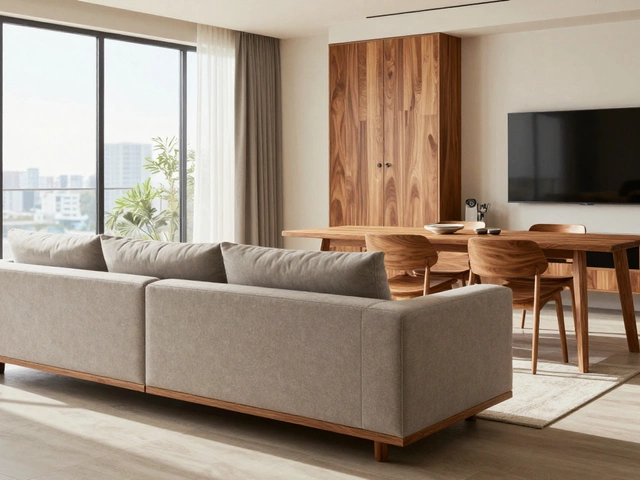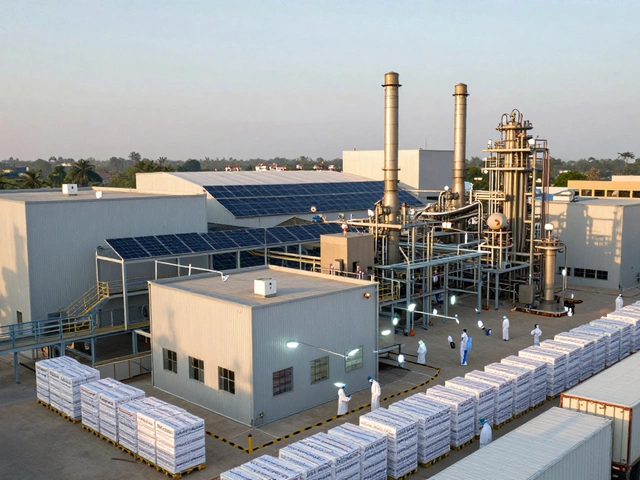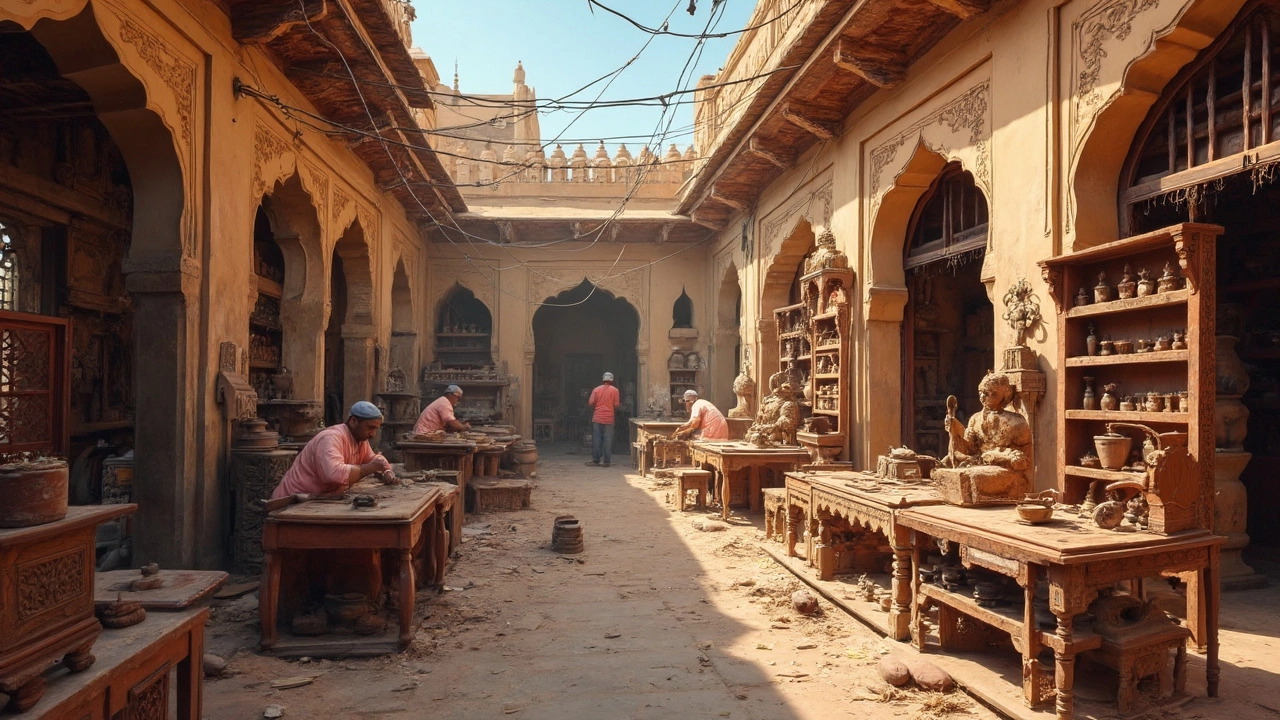
India, with its colorful heritage and dexterous craftsmanship, has taken a central position in the global furniture arena. Whether you're an investor or a small business owner, pinpointing the best manufacturing spot can set you up for success. Want to know where to start?
In India, places like Jodhpur, Saharanpur, and Kerala don't just sound exotic; they bring unique flair to furniture manufacturing. These regions have their roots in creating furniture that echoes their rich cultural narratives. Fun fact? Jodhpur is often called the "Blue City" of Rajasthan, but it's not just about the hues; it's a furniture hub thanks to its mastery over traditional designs and skilled woodwork artisans.
What makes one location better than another? It's all about resources, talent, and infrastructure. Some areas have an abundant supply of raw materials, while others boast skilled craftspeople who've perfected their art over generations. You'll also want to think about logistics - because let's face it, a beautiful piece of furniture isn't much good if you can't get it where it needs to go efficiently.
- The Rise of Indian Furniture Manufacturing
- Key Locations for Furniture Production
- Advantages of Regional Expertise
- Logistical Considerations
- Future Trends in Indian Manufacturing
The Rise of Indian Furniture Manufacturing
Once considered a niche market, furniture manufacturing in India has taken giant leaps over the past couple of decades. Today, India not just competes but thrives in the global furniture industry, blending traditional craftsmanship with modern technology.
The Cultural Backbone
India's diverse culture is a huge asset to its furniture industry. With each region bringing its own style and skills, the variety in furniture designs is simply amazing. Whether it's the intricate carvings from Saharanpur or the rustic charm of Jodhpur's creations, the cultural richness translates into unique pieces that appeal to both domestic and international markets.
Economic Motors and Markets
The Indian government's focus on boosting local industries is also a game changer. Initiatives aimed at improving manufacturing processes and encouraging exports have put India on the map. According to the India Brand Equity Foundation, the country's already robust domestic demand continues to grow, helping to fuel this upward trend.
Plus, the younger generation is shifting towards stylish yet affordable options, causing a spike in demand. This trend encourages more investment in furniture manufacturing, creating a cycle of growth and innovation.
Skills and Sustainability
Skilled labor is another reason behind India's success in the furniture market. Traditional craftsmen, who have honed their skills over generations, now work alongside modern technologies to produce exceptional quality furniture. Advanced machinery helps speed up production while ensuring precision, and craftspeople bring the human touch, combining the best of both worlds.
Sustainability is becoming a big player too. Many Indian manufacturers are investing in eco-friendly practices, using responsibly sourced materials and sustainable production methods. This not only helps the planet but also appeals to eco-conscious consumers worldwide.
| Year | India's Export Growth Rate (%) |
|---|---|
| 2020 | 15 |
| 2021 | 20 |
| 2022 | 25 |
The stats are clear: India's furniture export growth is consistently on the rise, reflecting both high demand and exceptional production capabilities.
Key Locations for Furniture Production
India is a vast country with diverse furniture manufacturing hotspots that have earned a special place in the industry. Several cities and regions are known for their unique contributions to the furniture manufacturing India scene. Whether you're drawn to traditional woodwork or innovative new designs, knowing where to set up shop can make all the difference.
Jodhpur: The Blue City Craftsmanship
Jodhpur is a superstar in furniture circles, famed for its traditional and artisanal woodworking skills. The city has a rich legacy of creating beautifully crafted solid wood furniture that attracts buyers worldwide. Styles here often lean on classic Rajasthani aesthetics, incorporating intricate carvings and robust structure.
Saharanpur: A Carving Wonderland
When it comes to finely carved wooden furniture, Saharanpur is the place to be. Situated in Uttar Pradesh, this region is synonymous with exquisite craftsmanship. The local artisans specialize in hand-carved designs that transform even simple pieces into statement furnishings.
Chennai: A Modern Manufacturing Powerhouse
Chennai stands out as a hub for both traditional and contemporary furniture production. With robust manufacturing setups and skilled labor, it strikes a balance between artistic richness and modern efficiency. It's a go-to spot for furniture enterprises focusing on both indigenous designs and minimalist, modern aesthetics.
Kerala: The Land of Rosewood
Famed for its luxurious rosewood products, Kerala offers another dimension to furniture manufacturing with its emphasis on using premium wood species. The local industry revels in creating pieces that boast durability and elegance, making them sought after in both domestic and international markets.
If you're contemplating entering the Indian furniture industry, understanding these hotspots and their strengths can guide your business decisions. Each location offers a distinct set of advantages, from artisan skills and raw materials to efficient supply chain solutions. Take these into account, and choose a spot that aligns best with your goals.
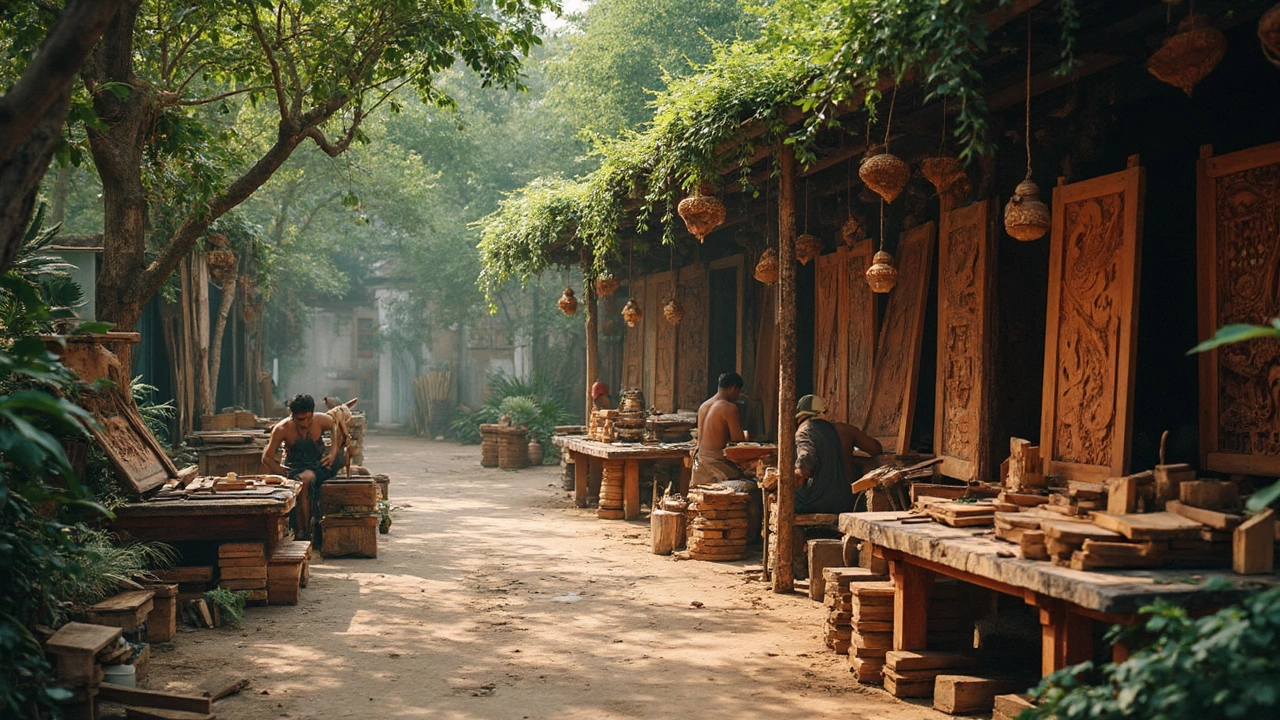
Advantages of Regional Expertise
When it comes to furniture manufacturing in India, different regions offer unique benefits. Jodhpur, for example, is synonymous with handcrafted wooden furniture. The artisans here have honed their skills over generations, creating stunning pieces with intricate designs that can't be found elsewhere.
Saharanpur is another hotspot. Renowned for its carved wooden furniture, this city brings together traditional artistry with a touch of modern flair. The expertise isn’t just a matter of tradition; it's backed by a robust local supply chain that ensures efficient production cycles.
Cost Efficiency
One big plus of tapping into regional expertise is cost. Places like Saharanpur and Jodhpur have a low cost of labor compared to urban centers like Mumbai or Delhi. Not to mention, sourcing raw materials locally slashes transportation costs significantly.
Quality Craftsmanship
It's not all about saving money, though. Quality is a hallmark of regional expertise in India. Craftspeople in these areas have an eye for detail unmatched by mass production. This has a direct impact on the longevity and aesthetic appeal of the furniture, making it highly sought after across the globe.
Specialized Skills
Different regions excel in different niches. In Kerala, the specialty lies in eco-friendly furniture crafted from rubberwood. Their sustainable practices have even attracted brands committed to green manufacturing.
| Region | Specialty | Notable Material |
|---|---|---|
| Jodhpur | Handcrafted wooden furniture | Acacia wood |
| Saharanpur | Carved wooden furniture | Sheesham wood |
| Kerala | Eco-friendly furniture | Rubberwood |
Understanding these regional strengths can make or break your manufacturing strategy. By aligning your business needs with the local expertise, you not only improve your product's quality but also gain an edge in the competitive Indian furniture industry.
Logistical Considerations
When diving into the world of furniture manufacturing, logistics is where the rubber meets the road. It's not just about crafting stunning pieces but ensuring they reach the customer efficiently, whether they're in the next town or across oceans.
Proximity to Raw Materials
One of the biggest logistical factors in furniture manufacturing India is the proximity to raw materials. Cities like Jodhpur and Saharanpur offer great locations because they’re close to wood suppliers. Investing in a factory close to where materials are sourced can significantly cut transportation costs and reduce lead times.
Transport Infrastructure
Then there's the actual movement of goods. Does the region have highways, ports, or rail connections? For instance, Chennai’s status as a coastal city with a major port makes it a viable choice for manufacturers eyeing international markets. Cities well connected by highways ease the cross-country transportation hassle as well.
Export Facilities
If you're eyeing global sales, the presence of export facilities is crucial. Kerala, with its robust infrastructure and well-functioning ports, offers fantastic export potential, especially to the Middle East. Even local markets can benefit from regions equipped with efficient export channels.
Warehouse and Distribution Centers
- Consider warehouse availability. More storage options mean you can manage inventory better.
- Distribution centers play a key role in quick dispatch and delivery.
- Proximity to urban centers can offer access to a larger consumer base.
Adding everything up, it's clear why selecting the right location is vital. With India’s growing reputation in the furniture industry, being strategic about logistics from the get-go can give you an undeniable edge.
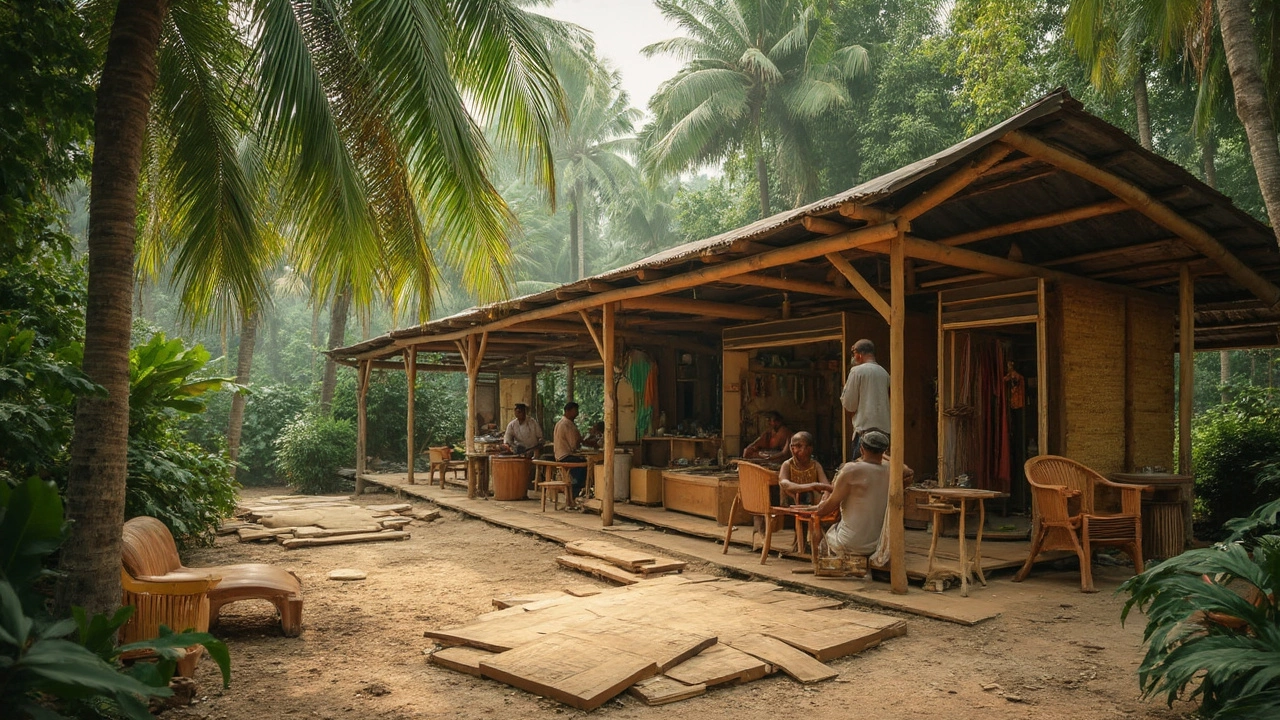
Future Trends in Indian Manufacturing
The landscape of furniture manufacturing in India is experiencing a significant transformation, driven by technological advancements and changing consumer preferences. Let's take a closer look at what's shaping the horizon.
1. Embracing Technology and Automation
The integration of technology is no longer optional; it's a necessity. Indian manufacturers are increasingly adopting automation and AI-driven systems to enhance efficiency and precision in production. This shift not only reduces labor costs but also ensures consistency in product quality.
2. Sustainable Manufacturing Practices
Environmental consciousness is taking center stage. Businesses are under pressure to adopt sustainable practices, using eco-friendly materials and minimizing waste. Regions like Kerala, with their abundance of bamboo and plantation wood, are leading the charge in producing sustainable furniture.
3. Rise of Customized Furniture
Customization is becoming a mega-trend worldwide. In India, manufacturers are catering to this demand by offering tailored designs that fit individual needs and spaces. This gives a competitive edge, as personalized furniture solutions grow in popularity.
4. Digital Marketing and Online Sales
The importance of an online presence cannot be overstated. The growth of e-commerce platforms is opening new revenue streams for furniture manufacturers, who are now reaching international markets from local hubs. Effective digital marketing strategies are crucial for tapping into this potential.
5. Demand for Smart Furniture
With the smart home trend expanding, the demand for smart furniture is on the rise. Indian manufacturers are exploring innovative designs like app-controlled recliners and desks with built-in charging ports, keeping them at the cutting edge of design.
| Future Trends | Impact |
|---|---|
| Technology Adoption | Increased Efficiency and Consistency |
| Sustainable Practices | Eco-friendly Production Methods |
| Customized Offerings | Personalized Consumer Experience |
| Smart Furniture | Integration with Smart Home Tech |
Overall, the Indian furniture industry is poised for exciting developments. By keeping an eye on these trends, manufacturers can maintain competitiveness in this dynamic market landscape.
